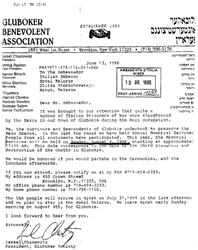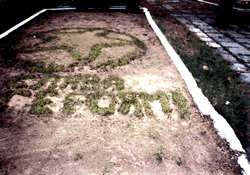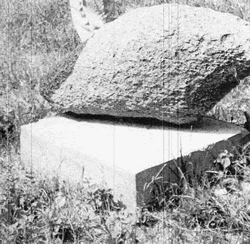Italian POWs' taken to Glubokie during the war
Got a message today from STEFANIA ELENA CARNEMOLLA, a journalist in Italy who is writing a story about
Glubokoje in the Nazi period. She mentioned that in Glubokoje there is a
graveyard and a tomb with 200 Italian soldiers who were slaughtered by Nazis
in 1944.
She sent me a copy of a letter from the Gluboker Benevolent Association
dated June 13, 1996 and it mentioned the slaughtering of the 200 Italian
soldiers. A copy of the letter can be seen at:
http://www.jewishgen.org/belarus/images/GlubokojeBenevolentAssociationLetter
.jpg
She is looking to talk with anyone from the Gluboker Benevolent Association
or anyone else who might know information about the 200 Italian soldiers.
If you know any information about the Gluboker Benevolent Association or
what happened to the Italian soldiers, e-mail me and I will put you in
contact with the Italian journalist.
Thanks
Dave Feldman
Belarus SIG Co-Coordinator
I (eilat) wrote to the sig:
I created a page for Glubokie:
http://www.eilatgordinlevitan.com/glubokoye/glubokoye.html and also
translated the Yizkor book for Glubokie
http://www.jewishgen.org/yizkor/Hlybokaye/Hlybokaye.html There is much
about the holocaust in Glubokie including pictures on both sites.
I was in touch with some people listed on the letter: Nathan Kasden
(of New Jersey) is distantly related to me.
Thank you very much,
Eilat Gordin Levitan
Los Angeles
It is all very interesting. I think that I now understand why the Italian POWs' were taken to Glubokie! Glubokie had much industry and was one of the last place in the area (for the Jews) to be liqudated ( 1943), since they ( the Jews) established and worked as slaves in the factories look at pictures 19 and 22- 32, all of Jews working as slaves for the Nazis in 1943;
http://www.eilatgordinlevitan.com/glubokoye/glubokoye.html.
From the Yizkor book:
"When the Jews of Glubokie realized what a dismal destitute they had fallen into, they began to search for ways in which to save themselves from coming annihilation. Since it was impossible to flee Glubokie, and there was nowhere to flee at that time, the Judenrat began to establish all kinds of undertakings and workshops, where Jews would be able to work and to be "useful". The Germans gave their assurance; Jews who work and prove their usefulness with the work, will not be harmed. At the beginning of 1942 Glubokie became, thanks to the Jews, a truly industrialized factory-city"...:for the rest go to: http://www.jewishgen.org/yizkor/Hlybokaye/hly136.html#Page144
The date of the final Action was August 20, 1943.
So they needed new work force for the factories in Glubokie!
What I found about the Italians was; "In the period from September 1943 to the collapse of the Nazi regime in May 1945, at least 600,000 Italian prisoners of war were deported to Germany and other areas of eastern Europe occupied by Germany and forced to work under brutal and inhuman conditions in German factories—in particular, the armaments industry. An estimated half a million died in the course of their deportation and hard labour."
The area of Glubokie was liberated by the Soviet Red Army in the summer of 1944. The Germans must have killed the Italians Just before the Red Army came. They did the same for a few Jews and other slave labourers they kept alive until that time- who worked for them in other camps in the area (The Vileyka labour camp- very near Glubokie) Shimon Zimerman wrote:
On June 1944 the Red Army reached the Vileyka area. At that time Riva and I were involved with an underground newspaper. The whole staff of the paper left the woods to the village Polsa near Vileyka. We watched the Nazis running for their lives. In all the panic they forgot to destroy the bridge on the river Vilya. The colors of battle still hung in the sky, but huge undisturbed Russian army was approaching. Red Army tanks supplied by the Americans, crossed the river Villya and continued toward Molodechno, the main cross roads between Minsk and Vilna. We immediately drove to Vileyka. We found the city destroyed by fire. The Jewish school Tarbut and the synagogue were still burning when we got there. We quickly ran to the building of the Es de. We knew that until the last days, a few dozen professional Jews that worked for the Germans were alive. We found no Jews, but I did find a letter written in Yiddish which was written in poem style. It was written by Motke Aves. In the letter he wrote, "we hear the sound of the tanks, to us they are the sounds of the bells announcing the coming of the Jewish messiah, but we know that they are not ringing for us, we would not be saved. I ask for forgiveness that I didn't consider escaping from the ghetto and shout with bitter cries, revenge the blood of your brothers." Later I gave the letter to the local newspaper and it was printed in Russian translation.
We found out that the Jews, together with other ( non Jews) prisoners from the Vileyka prison, were taken on trucks in the direction of Tzintzivi. We quickly drove there. Just a few kilometers from Vileyka, in a big field next to the road, we saw smoke and smelt the stench of burning meat. We knew that smell well from the time we were in the Vileyka camp. The smell was familiar to us since after every Actzya (action where the Jews were gathered and massacred), bodies were burned. As we approached the area we were greeted with a horrifying scene. A large group of semi burned bodies had been thrown in a giant pile. A constant stream of Red Army soldiers passed us on the way to Smorgon and Vilna. One of the Soviet officers put a huge sign saying, "Stop, look at the horrible deeds of the fascist Nazis. Revenge these victim's blood." The next day we buried the murdered as brothers, in one huge grave. Amongst them were a number of Jews from Kurenitz who had believed even until their last days that they would stay alive. One of them was Motke Aves.
http://www.jewishgen.org/Yizkor/kurenets/kur315.html
Thanks,
Eilat
dear eliat,
i read all you sent me "open mouth".
poor italian soldiers had simply to build anything which could stop red army. some partisans wrote that italian prisoners were in the glubokoje area, as well as some of citizens from glubokoje and surroundings, who survived.
nazis? they were simply stupid, as we know.
as to our poor italian soldiers, just sending you a photo of their grave, and how it is now .
best regards
stefania
ps. i will probably publish my article in magazine entitled 50&Più. when it comes out, just will send the original pdf.
ps. 2 by the way, sending now by attachment my extensive article about jewish library of rome looted by nazis in 1943. they are still looking for it!
I was in touch with some people listed on the letter: Nathan Kasden
(of New Jersey) is distantly related to me.
Thank you very much,
Eilat Gordin Levitan
Los Angeles


